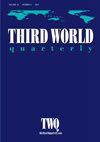枪支、性别和石油:对东帝汶发展轨迹潜在动力的批判性分析
IF 1.8
2区 经济学
Q2 DEVELOPMENT STUDIES
引用次数: 0
摘要
摘要本文考察了冲突后东帝汶不平衡发展结果的潜在政治经济背景。我们使用结构政治经济学方法的修改版本,该方法位于葛兰西对国家-社会关系的理解中。这种方法将发展概念化为历史上特定的基于阶级和基于性别的资源分配争论的过程,这种争论导致通过创造财富的体制和意识形态机制的结合来维持特定形式的社会政治秩序。我们对东帝汶独立后谁的利益被优先考虑和边缘化的分析是基于对三个主要因素的系统检查:阶级关系的调节、性别关系的组织和石油工业的治理。我们得出的结论是,尽管东帝汶在正式民主制度的形成方面取得了一些重要进展,但权力分配和资源获取的过程仍然远远没有实现包容性,优先考虑以阶级为基础的男性主导精英群体,他们操纵制度来推进自己的利益,并利用霸权的性别意识形态来证明和维持这些现有的不平等安排在主流社会政治秩序中。因此,从更大的历史角度来看,东帝汶的发展成果与政治经济进程密切相关。关键词:东帝汶国家机构;抵抗运动;两性关系;石油工业致谢作者感谢《第三世界季刊》的编辑和三位匿名审稿人提供的宝贵和建设性的意见。披露声明作者未报告潜在的利益冲突。作者简介:silver B. Sahin,土耳其安卡拉比尔肯特大学国际关系助理教授。她是《国际干预和国家制定:例外如何成为规范》(Routledge, 2015)一书的作者。她的研究主要集中在制度和政府成果的社会动态,并发表在民主化,发展政策评论,当代亚洲杂志,亚洲研究评论,澳大利亚国际事务杂志和国际维和。Stepan Verkhovets,加拿大蒙特利尔麦吉尔大学政治学系博士研究生。他在《当代亚洲杂志》和《全球化》上发表了关于制度和政府结果的政治经济学研究成果。本文章由计算机程序翻译,如有差异,请以英文原文为准。
Guns, gender and petroleum: a critical analysis of the underlying dynamics of Timor-Leste’s development trajectory
AbstractThis article examines the underlying political economy context of the uneven development outcomes in post-conflict Timor-Leste. We use a modified version of a structural political economy approach that is situated in a Gramscian understanding of the state-society relationship. This approach conceptualises development as a process of historically specific class-based and gender-based contestations over the distribution of resources that result in particular forms of socio-political orders maintained through a combination of institutional and ideological mechanisms of wealth generation. Our analysis of whose interests have been prioritised and marginalised in post-independence Timor-Leste is based on a systematic examination of three major factors: regulation of class relations, organisation of gender relations, and the governance of the petroleum industry. We conclude that despite some important improvements in the formation of formal democratic institutions in Timor-Leste, the processes of the distribution of power and access to resources remain far from being inclusive prioritising a class-based group of male-dominant elites that manipulates institutions to advance their interests and use a hegemonic gender ideology to justify and maintain these existing unequal arrangements in the prevailing socio-political order. Thus, the development outcomes in Timor-Leste are strongly connected to the political-economic processes from a larger historical perspective.Keywords: Timor-Lestestate institutionsresistance movementgender relationspetroleum industry AcknowledgementsThe authors are grateful to the editors and three anonymous referees of Third World Quarterly for their valuable and constructive comments.Disclosure statementNo potential conflict of interest was reported by the author(s).Additional informationNotes on contributorsSelver B. SahinSelver B. Sahin is Assistant Professor of International Relations at Bilkent University, Ankara, Turkey. She is the author of International Intervention and State- Making: How the Exception Became the Norm (Routledge, 2015). Her research is focused on the social dynamics of institutional and governmental outcomes and has been published in Democratisation, Development Policy Review, Journal of Contemporary Asia, Asian Studies Review, Australian Journal of International Affairs, and International Peacekeeping.Stepan VerkhovetsStepan Verkhovets is a PhD student at the Department of Political Science, McGill University, Montreal, Canada. He has published his research work on the political economy of institutional and governmental outcomes in the Journal of Contemporary Asia, and Globalizations.
求助全文
通过发布文献求助,成功后即可免费获取论文全文。
去求助
来源期刊

Third World Quarterly
DEVELOPMENT STUDIES-
CiteScore
4.10
自引率
15.00%
发文量
137
期刊介绍:
Third World Quarterly ( TWQ ) is the leading journal of scholarship and policy in the field of international studies. For almost four decades it has set the agenda of the global debate on development discourses. As the most influential academic journal covering the emerging worlds, TWQ is at the forefront of analysis and commentary on fundamental issues of global concern. TWQ examines all the issues that affect the many Third Worlds and is not averse to publishing provocative and exploratory articles, especially if they have the merit of opening up emerging areas of research that have not been given sufficient attention. TWQ is a peer-reviewed journal that looks beyond strict "development studies", providing an alternative and over-arching reflective analysis of micro-economic and grassroot efforts of development practitioners and planners. It furnishes expert insight into crucial issues before they impinge upon global media attention. TWQ acts as an almanac linking the academic terrains of the various contemporary area studies - African, Asian, Latin American and Middle Eastern - in an interdisciplinary manner with the publication of informative, innovative and investigative articles. Contributions are rigorously assessed by regional experts.
 求助内容:
求助内容: 应助结果提醒方式:
应助结果提醒方式:


